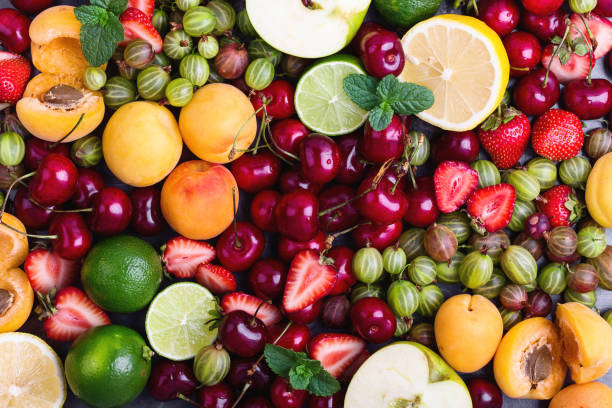Life Style
The Best Foods For Treatment of Acne and Getting Healthy Skin
Published
7 months agoon
By
John
Acne, a common skin condition that affects millions of individuals worldwide, can be a persistent and frustrating concern. While topical treatments and skincare routines play a crucial role in managing acne, the significance of a balanced and nutritious diet should not be underestimated. Accutane for acne also help to cure acne.
Achieving and maintaining healthy skin involves a combination of good skincare practices, a balanced lifestyle, and proper nutrition. Consistent cleansing, moisturizing, and protection from the sun are fundamental aspects of a skincare routine. Using gentle cleansers and avoiding harsh chemicals can help preserve the skin’s natural balance. Regular moisturizing helps keep the skin hydrated and supple, preventing issues like dryness and flakiness. Sun protection through the use of sunscreen is crucial to guard against harmful UV rays that can lead to premature aging and skin damage.
In addition to external care, a healthy lifestyle plays a pivotal role in skin health. Staying hydrated by drinking an adequate amount of water supports skin hydration from within. Adequate sleep is essential for skin regeneration, as the body undergoes repair processes during rest. A well-balanced diet rich in vitamins, antioxidants, and essential nutrients contributes to skin vitality. Incorporating fruits, vegetables, and foods with omega-3 fatty acids can promote a radiant complexion. Overall, a holistic approach that combines proper skincare habits with a healthy lifestyle is key to achieving and maintaining healthy skin.
What skin expert says on acne?
Skin experts commonly emphasize the multifactorial nature of acne and stress the importance of a personalized approach to treatment. According to dermatologists, identifying the specific triggers for each individual’s acne is crucial in developing an effective management plan. They often highlight the significance of gentle skincare routines, including non-comedogenic products and regular cleansing, to maintain skin health.
Moreover, skin experts emphasize the role of professional guidance in managing acne. Dermatologists stress the need for timely intervention and prescription medications when necessary. They highlight that while over-the-counter products can be beneficial, severe or persistent acne may require prescription-strength treatments. Dermatological insights often underscore the importance of patience in treating acne, as results may take time, and consistency in the chosen regimen is essential for long-term success. Overall, seeking advice from a qualified skin expert can provide tailored solutions and improve the chances of effectively managing and minimizing acne-related concerns.
Further, we will explore the realm of acne-curing foods, delving into the natural wonders that can contribute to clearer and healthier skin.
Omega-3 Fatty Acids:
Found abundantly in fatty fish like salmon, mackerel, and sardines, omega-3 fatty acids possess anti-inflammatory properties that can help combat acne. These essential fats play a vital role in maintaining skin health by reducing inflammation and promoting overall skin elasticity. Incorporating fish into your diet a couple of times a week can make a noticeable difference in the appearance of your skin.
Colorful Fruits and Vegetables:
Rich in antioxidants, vitamins, and minerals, colorful fruits and vegetables are a powerhouse of nutrients that support skin health. Berries, tomatoes, spinach, and carrots are packed with antioxidants like vitamin C and beta-carotene, which aid in repairing damaged skin cells and promoting a radiant complexion. Including a variety of these vibrant foods in your meals ensures a well-rounded intake of essential nutrients.
Probiotics:
A healthy gut is closely linked to healthy skin, and probiotics play a crucial role in maintaining gut balance. Yogurt, kefir, sauerkraut, and other fermented foods are excellent sources of probiotics. These beneficial bacteria help regulate the digestive system and contribute to a clearer complexion by reducing inflammation. Consider incorporating probiotic-rich foods into your daily diet to support both your gut and skin health.
Zinc-Rich Foods:
Zinc is a mineral that plays a pivotal role in regulating oil production in the skin and promoting wound healing. Foods such as lean meats, nuts, seeds, and legumes are excellent sources of zinc. Including these in your diet can help control sebum production, reducing the likelihood of clogged pores and acne breakouts. Isotretinoin 40 mg also helps in getting clear and acne free skin.
Green Tea:
Known for its numerous health benefits, green tea is a powerhouse of antioxidants, particularly catechins. These antioxidants possess anti-inflammatory and antimicrobial properties, making green tea a valuable addition to an acne-friendly diet. Swap your regular beverages with green tea to enjoy its skin-boosting benefits.
Conclusion:
While there is no one-size-fits-all solution for acne, incorporating these acne-curing foods into your diet can contribute to clearer and healthier skin. Remember that patience and consistency are key when seeking improvements in your skin’s condition. Additionally, staying hydrated, practicing good skincare habits, and maintaining a healthy lifestyle will enhance the effectiveness of these acne-curing foods. Embrace the power of nature’s bounty, and let your radiant, acne-free skin reflect your commitment to overall well-being.

Navigating the Indian Visa Process for UK and Canadian Citizens

Navigating the Indian Business Visa Application: Common Mistakes to Avoid

Navigating the Indian Visa Process: A Guide for Vietnamese and Zambian Citizens

Navigating the Indian Visa Process: A Guide for Vietnamese and Zambian Citizens

Navigating Visa Requirements: India for French Citizens and Canada for German Citizens

Guide to Obtaining a New Zealand Visa from Switzerland

Complete Guide to New Zealand Visa for Spanish Citizens

SAUDI ARABIA BUSINESS VISA RENEWAL

Indian Visa for Cruise Passengers

NEW ZEALAND VISA FOR CANADIAN CITIZENS

Navigating the Indian Visa Process for UK and Canadian Citizens

Navigating the Indian Business Visa Application: Common Mistakes to Avoid

Navigating the Indian Visa Process: A Guide for Vietnamese and Zambian Citizens

Navigating the Indian Visa Process: A Guide for Vietnamese and Zambian Citizens







